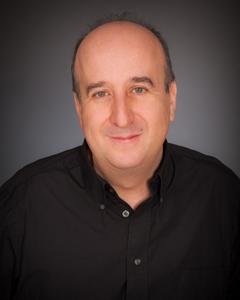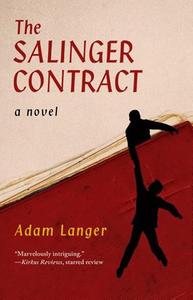
|
|
| Photo: Anthony Collins | |
Adam Langer was born and raised in Chicago's West Rogers Park neighborhood. He left Chicago in 1984 to attend Vassar College, and returned in 1988 and worked for over a decade as an editor, nonfiction author, playwright, theater director and very occasional film producer. He served as senior editor of Book Magazine until that publication folded in 2003. He is the author of five novels and one memoir and is now arts & culture editor of the Jewish Daily Forward. His new novel, The Salinger Contract (reviewed below), is about books, publishing, money and nefarious goings-on concerning authorship and crime.
Where did the idea for The Salinger Contract come from? Were you once approached by another author (Conner Joyce in your book) to write a novel?
In a way, I was, although I honestly can't talk about it. At the same time, I understand that, since the narrator of my novel is rather unreliable, I can't really be trusted to give an honest answer on this, and when I say that I can't talk about it, it may sound like I'm making it up. Then again, I'm not sure if I would trust any author to give an honest answer on this topic, or any topic, even when we're trying to be honest. The same thing's true when it comes to answering the question of what inspired the novel.
When I think back to when I started writing it, I think I wanted to satirize the concept of how a book could be used to save someone's life. That's what makes sense to me now and what sounds right. But the person who wrote this novel and the person who's responding to this question are, in a sense, two different people. Basically, I like to start with reality and then take a vicious left turn from it and see where I wind up. The process of writing is always a process of discovery, and I suppose that figuring out what inspired the novel is part of that discovery process.
Where did your main character, Adam Langer, come from? Might he be a bit autobiographical?
You'd think so, wouldn't you? But in a sense he's no more or less autobiographical than the rest of the characters. I share a name with him. And I share a profession with him and certain biographical elements. But he's sort of like me reflected in a funhouse mirror--some characteristics exaggerated, some reduced, and also some invented entirely. There are certain reasons why I chose to give him my name, but that's more to undercut readers' and even my own expectations than to conform to them. To tell you the truth, when I was a kid, I never really liked my name and to tell you the further truth, I'm not all that sure I like the character who I gave that name. He's okay, but I wouldn't trust him.
Are you an author who enjoys fooling around with the possibilities inherent in metafiction?
Yes, if it's possible to like metafiction without liking the word "metafiction." I like puzzles and games and stories within stories and frames within frames and what the French call "mise en abyme." Some of my favorite authors are the ones who experiment with the form and comment on the form. But I'm not married to experimentation, and some of my work is more metafictional than others. And some of my least favorite authors also happen to be ones who experiment with metafiction. Sometimes I'm perfectly satisfied with straight, traditional, narrative realism. And sometimes experimentation for its own sake can give me as much of a pain in the ass as anything else. I like to mix it up, both in what I read and what I write.
Who's the model for your other key character, Conner Joyce? Might it be Adam Langer?
No. Or yes. Or maybe. When I invent a character, I only find out later where I got him. When I wrote Conner, I wanted him to be someone I truly sympathized with. Not one of those experimental metafictional writer types--someone who believed in stories for their own sake, who believed that telling a good story truly could save someone's life. I've encountered folks along the way who remind me a little of Conner--decent, honest, hardworking artists who approach writing as a craft. Names like Will Vlautin, Andre Dubus III, Bill Lychack, Miles Harvey, Jad Davenport and others come to mind. But I didn't base Conner on any of them. Nor did I base Conner Joyce on my journalist friends Thomas Conner and Cynthia Joyce, though they do have good names.
How much fun was it to poke fun at the book publishing world?
For me, writing a book has to be fun no matter what the topic. Whether I'm writing about growing up in Chicago or about New York real estate or about publishing or academia, I find that I have to enjoy doing it. Once it starts feeling laborious, then I know that the reading of it will be laborious. I wasn't really interested in satirizing books and book publishing, per se. I wanted to tell an entertaining story. If some humor comes at the expense of the book world, so be it, but it wasn't my primary intention.
There's no sleight of hand in the novel dealing with e-books. Did you avoid that on purpose?
I'll have to save that for the movie version, I guess. Or the enhanced, expanded e-edition. But the main characters in my novel are sort of old-school--the sort of people who remember when books were physical books; they're people who love the feel and smell of books. Having them wandering out with their Kindles and their Nooks doesn't really have the same image and impact that I was going for. And to tell you the truth, I don't use my Kindle as much as I used to about a year ago. I wonder if that's true for other readers, too.
 The novel has a nice noirish atmosphere. Is there some "pulpishness" at work here?
The novel has a nice noirish atmosphere. Is there some "pulpishness" at work here?
Sure. I like that genre a lot. Or at least I do in theory. There are a lot of elements of noir that I'm not so crazy about--the formulaic nature, the misogyny, and so forth. Probably I'm more influenced by noir film than noir lit--and, if you look closely at the novel, you'll probably find some quotes that Humphrey Bogart said in a movie or two.
Were there any books that influenced you as you put together this literary mystery-puzzle?
Well, John le Carré's The Russia House is an influence on Conner, so that's one. Plus, Alain Robbe-Grillet's script to Last Year at Marienbad is important to the characters, too. But I'm not sure how those books did or didn't influence me. There are books and authors I love--Virginia Woolf and G.K. Chesterton and Joseph Conrad and Edna O'Brien and Tom Stoppard and N.F. Simpson and Billy Wilder and a ton of others. But I have no idea if any of their influence seeped into this book at all. I hope so, but I really don't have a clue. I try to be as unself-conscious in the process as possible, even when I'm writing a character who bears a passing resemblance to me.
Who plays Adam Langer in the movie version of the book? Who would be good for some of the other characters?
A screenplay version actually exists, and the funny part is I'm not a character in it. I changed it a lot. But the answer is I don't know, really. I like to stay out of those discussions as much as possible. I tend to like movies where I'm not familiar with the actors in it anyway, movies directed by Leos Carax or Olivier Assayas or Cedric Klapisch or Joachim Trier. I liked the movie Margin Call a lot and maybe the lead in that would be good, but I don't remember his name. But when I say things like that, my agents usually look at me and tell me I should shut up. Maybe Cate Blanchett?
In the novel you have this line: "It was as if they were being paid to dream." Do you write this way?
In a way. It's an organic process. Which sounds pretentious and I apologize for that. But I like to be surprised. I don't like to know what happens next. I like writing to be a process analogous to reading where I really do turn the page and feel that whatever is on it is something I didn't expect. That's sort of like dreaming, although often my dreams tend to be formulaic; I hope my fiction is less predictable than my dreams.
What's next for Adam Langer? Either one!
Well, for the Adam responding to this question, I have three books in various stages of completion that I'd like to finish as soon as I can, and I'm working on completing a draft of the screenplay of my novel The Thieves of Manhattan. Also, I need to pick up a bread from the bakery and finish making dinner. As for the Adam in my novel, well, he's got more than enough to worry about now, and I imagine he has to finish writing his next book. He promised he would, after all. --Tom Lavoie, former publisher

